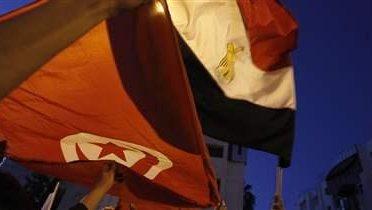Content from the Brookings Doha Center is now archived. In September 2021, after 14 years of impactful partnership, Brookings and the Brookings Doha Center announced that they were ending their affiliation. The Brookings Doha Center is now the Middle East Council on Global Affairs, a separate public policy institution based in Qatar.
Egypt and Tunisia have both held relatively successful elections, ushering in parliaments with popular mandates. Both countries also saw landslide Islamist victories which provoked fear among both Arab liberals and the international community. The Brookings Doha Center (BDC) held its first “Transitions Dialogue” in January 2012, with the hope of providing a venue for addressing the emerging tensions that complicate and undermine prospects for successful transitions. With Egypt and Tunisia embarking on a long process of constitution writing and national dialogue, the Islamist-liberal divide is of particular concern, especially in light of the growing influence and reach of Salafi groups.
While national debates over identity and the role of religion in public life cannot be ignored, there are areas of political convergence between various parties – on the economy, foreign affairs, and the importance of civilian rule for example – that are just as important, if not more so.
This dialogue, chaired by BDC Director Salman Shaikh and Research Director Shadi Hamid, was the first of its kind to bring together mainstream Islamists, Salafis, liberals, and leftists along with U.S. and European officials to exchange ideas, develop consensus, and forge new understandings in a rapidly changing political environment. It also presented a unique opportunity for Egyptians and Tunisians to compare their different transition processes and see what, if any, lessons could be learned.
The program consisted of four sessions focusing on constitution drafting and the role of political institutions, economic recovery, the role of international actors, and ideological polarization and the role of religion in public life. These discussions were followed by country-specific working groups, in which Egyptians and Tunisians discussed immediate challenges and lessons learned in their own countries. Each group then shared their observations with the other. Many analysts have pointed to the “Tunisian model” as an example for the region. With this in mind, we were interested to see how the Egyptian and Tunisian participants would interact, considering the extent to which their fortunes have diverged.
Interestingly, until now, there has been little formal exchange or dialogue between the Muslim Brotherhood in Egypt and Al-Nahda in Tunisia, despite being the dominant Islamist parties in their respective countries. The same goes for leftists and liberals. Participants from one country routinely expressed surprise at what those from the other were saying. One Egyptian participant noted, for example, that if the Al-Nahda representative were in Egypt, he would be called a liberal.
Throughout the discussions, there was a sense that the political spectrum in each country was anchored in a very different place. Tunisians were surprised when a representative from Egypt’s Muslim Brotherhood complained that, during the election campaign, his party had been attacked by far-right Salafis as being too “liberal.” One Egyptian liberal, who was a candidate for parliament, complained: “I did not run a political campaign; I was running a campaign that depended on me telling voters I’m not an atheist.” At the same time, however, a Tunisian leftist observed that the Egyptian Salafi participant seemed considerably more moderate than Salafis in Tunisia, due in part to the former’s decision to commit to working within the democratic process.
Concerns over ideological polarization were raised repeatedly by both Egyptians and Tunisians. There was a general consensus that issues of identity had too often distracted from more urgent matters, namely addressing economic development, unemployment, and poverty. It was here that an important back-and-forth took place regarding the role that Western countries could play in helping stabilize Arab economies. Despite suspicion of Western intentions, nearly all participants agreed that the United States and Europe had an important role to play through economic assistance, with an emphasis on enhanced trade and investment. A fruitful discussion ensued between Arab and Western participants over what role the latter could play in supporting democratic reform and economic growth in these two transitioning countries.
The Arab uprisings will have a profound impact on policymaking and the future political landscape in the Middle East. With so much at stake, the transition process needs to be skillfully managed in order to lay the foundation for stable and sustainable governance. Discussions such as this one are an important step in exploring and better understanding this process.



